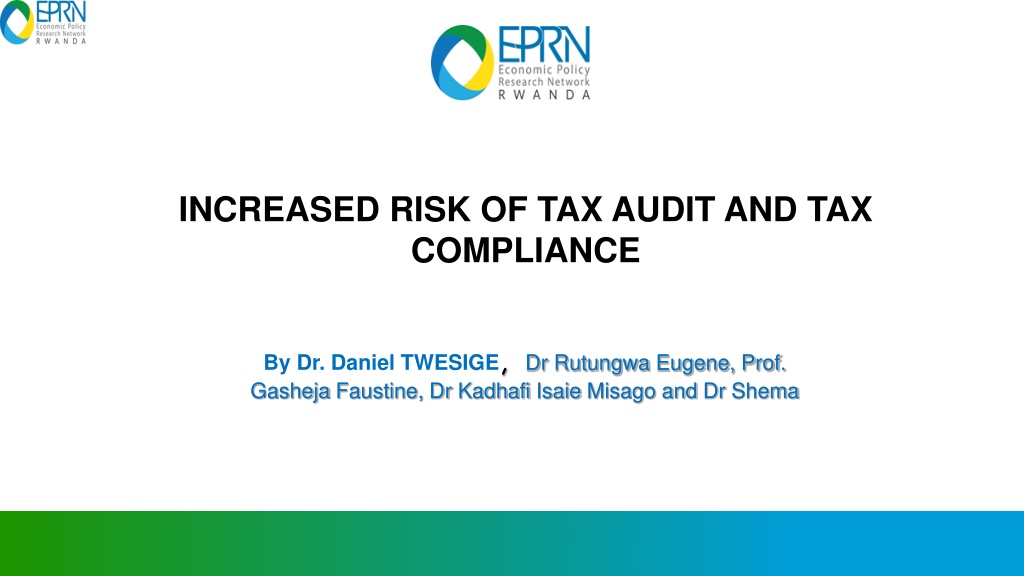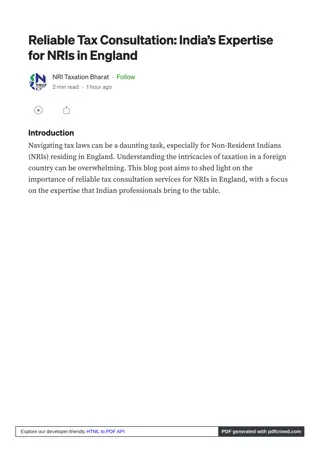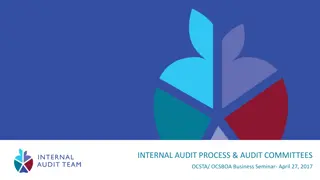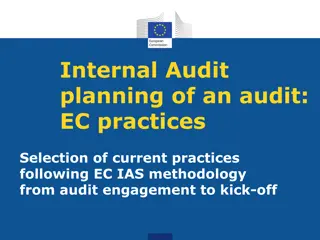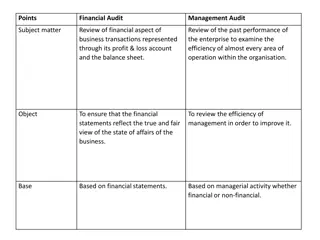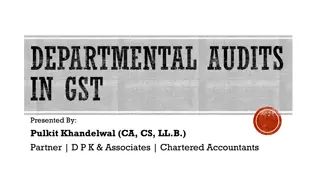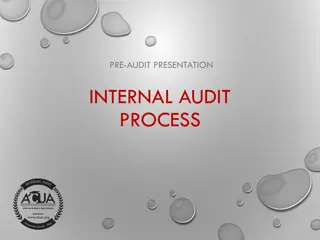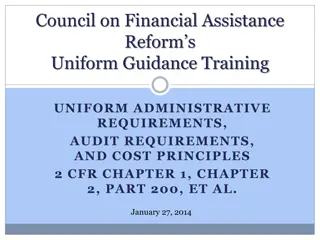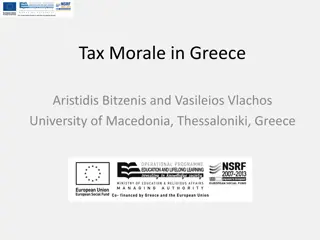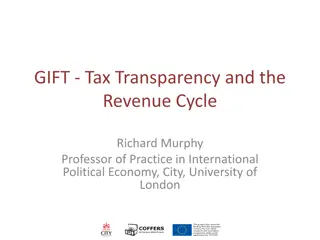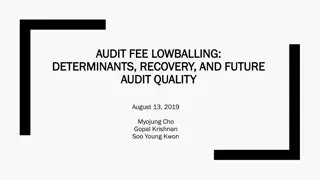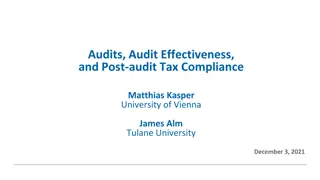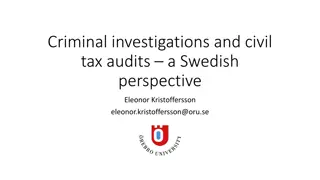Enhancing Tax Compliance: Factors, Audit, and Investigation" (56 characters)
Exploring factors influencing taxpayer behavior towards tax compliance, this study delves into the impact of tax audit and investigation procedures on adherence to tax laws at both corporate and individual levels. Previous research gaps are identified and addressed to provide a comprehensive understanding of taxpayer behavior. Supported by the Economic Policy Research Network and the International Centre for Tax and Development, this paper emphasizes the importance of strategies to enhance tax compliance for economic sovereignty. (381 characters)
- Tax Compliance
- Tax Audit
- Tax Investigation
- Economic Policy
- Taxation (find common tags rather than exact phrases)
Download Presentation

Please find below an Image/Link to download the presentation.
The content on the website is provided AS IS for your information and personal use only. It may not be sold, licensed, or shared on other websites without obtaining consent from the author. Download presentation by click this link. If you encounter any issues during the download, it is possible that the publisher has removed the file from their server.
E N D
Presentation Transcript
INCREASED RISK OF TAX AUDIT AND TAX COMPLIANCE By Dr. Daniel TWESIGE, Dr Rutungwa Eugene, Prof. Gasheja Faustine, Dr Kadhafi Isaie Misago and Dr Shema
This paper was done through financial support of the Economic Policy Research Network (EPRN) and International Centre for Tax and Development (ICTD) 2 Ministry of Trade and Industry 2013 Economic Policy Research Network
INTRODUCTION Economic sovereignty is the goal of any country. This can be achieved by increasing the share of tax to GDP. Increasing the share of tax to budget and GDP requires three distinguished but complementary policies : o Widening the tax base through creation of different economic activities and taxes o Increasing the tax rates and introducing new taxes o Developing strategies to enhance tax compliance
BACKGROUND-2 Willingness of taxpayers to pay tax has been one of major challenges facing the tax administrators across the globe since the creation man. Biblically, the story of joseph, king Solomon, Luke 20:19 etc Previous scholars Oyebaola & Fabrizio (2023), Giulia and christopher (2021), have highlighted challenges of tax compliance 6
Research questions 1. What factors influences the beheviour of taxpayers towards tax compliance at both corporate and individual level 2. Does tax audit and investigation procedures provided in the law influences tax compliance 7
Research gap Previous scholars (khlif &Achek,2015, Ziad et al. 2013, Hanafiah et al. 2019, Jing- Nie, et al. 2020 ..) have highlighted different factors Tax knowledge, tax audit, tax rates, corruption, role of tax authority, government spending .. Prior studies have not exhaustively looked at beheviour taxpayers at as per the size and form business and how gender influences the beheviour of tax payers Tax audit procedures have not been tested on how the contribute to tax compliance Thus current study filled those two gaps 8
Research design Research design ; Quantitative that combined both descriptive and correlation research Population and sampling ; Taxpayers within Kigali where a sample of 401 taxpayers were selected Data collection; Primary data collected using a closed ended questionnaire Data analysis: Descriptive statistics (mean & standard deviation) and inferential statistics (MANOVA and the independent t-test) and ordinal regression 10
First hypothesis (H1):There a statistical difference in the beheviour of taxpayers across categories Micro taxpayers Tax education, tax fairness & economic factors Tax education, tax penalties, Gvt spending, economic factors Small taxpayers 12
Tax audit, government spending, tax rates tax knowledge, tax education and tax penalties Medium taxpayers Tax audit, tax penalties, role of tax authority, tax education, tax knowledge Large taxpayers Pillai s trace test Firm size contributes 43.7% of the variation in compliance 13
Hypothesis 2(H1): There is a statistical difference in the beheviour of taxpayers across gender and form of business towards compliance Tax rates, tax education, tax penalties, roles of tax authority and tax knowledge Male taxpayers Female taxpayers GVT spending, corruption, fairness of tax rates and tax knowledge 14
Form of business organisation Pillai s trace test was 48.8% Gender Pillai strace test was 47.4% 15
Hypothesis 3 (H1): There is a statistical significant effect between tax audit and tax compliance Cox and Snell 78.0% Pseudo R- square P-Values Contradictory audit, compressive audit and issue rated audit P- value was 0.000 audit without notice P-value 0.014 and desk audit P-value 0.071 16
Conclusion and policy recommendations
Hypothesis 1: There is a mean difference in the beheviour of taxpayers towards tax compliance but they converge at tax education, tax rates and tax audit Hypothesis 2: There is a mean difference between female and male taxpayers at both individual and corporate level but also converge at tax education and tax rates Hypothesis 3: Tax audit is a major catalyst when influencing the beheviour of taxpayers 18
Tax education should be uniform across taxpayers The beheviour of taxpayers is different across taxpayers. Thus compliance policies should be designed to capture different taxpayers 19
